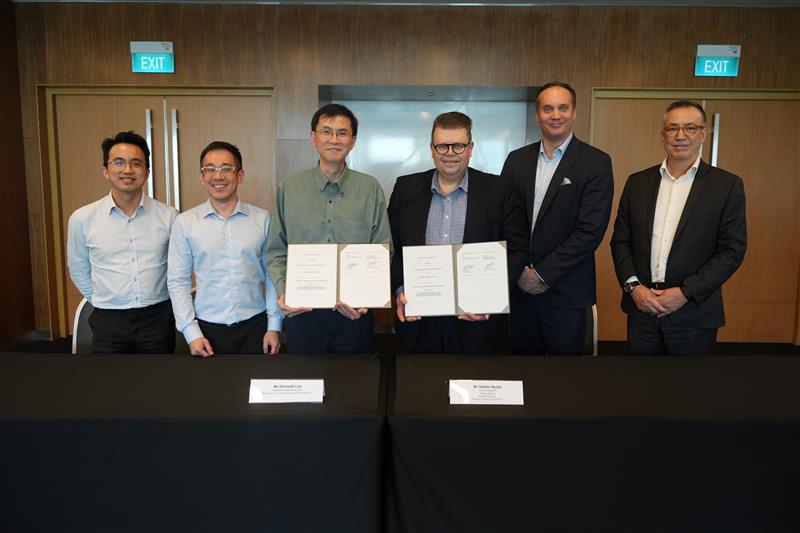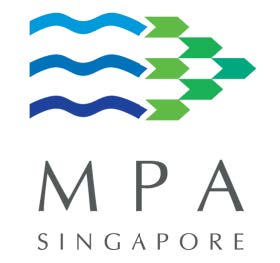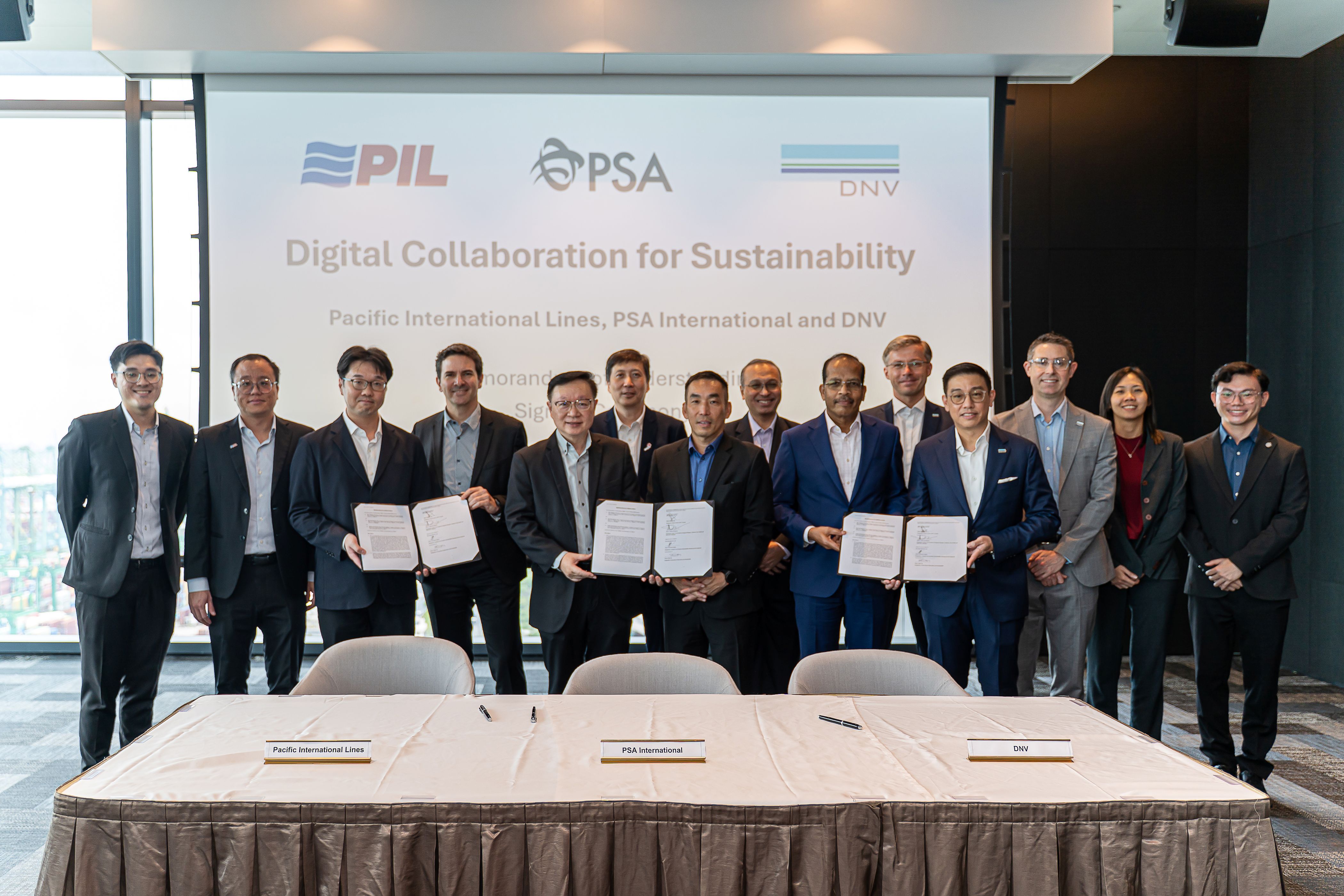
The global shipping regulator, the UN International Maritime Organisation, has set a target of net-zero carbon emissions by 2050 for the industry, and now needs to develop climate regulations by 2025 that make it possible to reach that target. A core challenge is how to craft a global greenhouse gas pricing regulation that can bridge the price gap between the cleanest fuels and fossil fuels, driving investments in green fuels, without imposing an outsized cost on the global economy. As member nations prepare for negotiations at the IMO MEPC 81 in March, the World Shipping Council is bringing to the table a proposal on greenhouse gas pricing that can help solve this conundrum.
The catastrophic effects of climate change every day, and as a significant emitter of greenhouse gases, the shipping industry must do its part and decarbonise by 2050. Container and vehicle carriers are building and already operating vessels that can run on the greenest fuels, but those fuels cost 3 to 4 times more, and the supply of green fuels is only a fraction of what is needed. Global climate regulations are necessary to make it possible for carriers to operate on green fuels, and to incentivize fuel and energy providers to invest in new production capacity.
The WSC Green Balance Mechanism outlines a new approach to greenhouse gas pricing which makes it possible to close the price gap between fossil fuels and green fuels, at the lowest possible overall cost:
·Through the Green Balance Mechanism, fees are taken from fossil fuels and allocated to green fuels used, so that the average cost of fuel is equal.
·The greater the greenhouse gas emission reductions a fuel delivers – on a well-to-wake lifecycle basis – the greater the financial allocation received.
·The monies collected in any given year is determined by the amount of green fuels used, allowing for a relatively low fee at the start of the transition.
·The minimum fee necessary to offset the price differential in a given year is collected and allocated to ships using green fuels that meet a specific greenhouse gas threshold. This ensures that green fuels can be produced and used and does so with the least possible cost to transportation.
·The emission reductions required for a fuel to receive a price-balancing allocation are linked to IMO decarbonisation requirements, increasing in stringency toward the 2050 net-zero goal.
·The Green Balance Mechanism is adaptable and fully integrated with a greenhouse gas fuel-intensity standard. It can be used as a targeted greenhouse gas pricing mechanism, or a possible addition to an integrated measure.
·Other fees can be added to raise funds for climate mitigation initiatives and Research, Development & Demonstration projects, to provide a just and equitable transition.
The Green Balance Mechanism makes it economically rational and attractive for both ship owners and energy providers to invest in fuels and technologies that deliver deep greenhouse gas reductions from the day the regulation takes effect. Existing and soon-to-be delivered dual-fuel ships will be able to operate on the cleanest fuels, rather than having to wait years before economically viable fuels are available. This allows production of the cleanest fuels to grow more quickly, accelerating economies of scale that will push down the cost of green fuels, getting us to zero in the most economically efficient way possible.
Quotes from WSC and member CEOs:
“Liner carriers are committed to decarbonising shipping and eager to support the development of effective and timely global climate regulations through the IMO. Switching from fossil fuels to green energy sources for the engine of global trade will take time and require massive private and public investments. It is our shared responsibility to make sure we meet the needs of our climate in a way that minimises the cost for the global economy,” says John Butler, President & CEO of World Shipping Council.
“Decarbonizing shipping will not be achieved by a single company, it will take the efforts and involvement of all the stakeholders. The CMA CGM Group has already invested more than $15 billion in decarbonizing its fleet, which will enable us to have 120 vessels capable of running on alternative fuels by 2028. As a next step we need to act collectively and to promote a level playing field at the global level for our industry. This is the aim of the ambitious positions we are advocating for with other shipping lines within the Word Shipping Council,” says Rodolphe Saadé, Chairman & CEO of CMA-CGM.
“Collective action is vital for the liner shipping industry in striving toward decarbonization. With 24 dual-fuel methanol vessels on order, we will further join forces with like-minded partners toward greening the future of shipping. It is essential to have a new approach to greenhouse gas pricing that would drive demand for cleaner fuels from the start of the transition. We need the support of authorities, vendors, and customers. Together, we can decarbonize,” says K.H. Wu, CEO of Evergreen.
"The World Shipping Council's proposal for the Green Balance Mechanism is a pragmatic step towards sustainable shipping. This greenhouse gas pricing mechanism aims to promote a competitive shift to low-emission fuels, which is consistent with our sustainability measures, our goal to operate a net-zero fleet by 2045, and the shipping industry’s overall commitment to decarbonisation. Additionally, it promotes the production of alternative fuels and minimises the economic burden on all stakeholders, ensuring a level playing field. These are crucial factors for a successful energy transition in maritime shipping,” says Rolf Habben Jansen, CEO of Hapag-Lloyd.
“Climate change is a defining issue of our time, and HMM shares a sustainability vision of the global shipping industry. To achieve net zero emissions by 2050, HMM has focused on enhancing carbon footprint visibility, ordering methanol-powered vessels, and exploring clean energy sources, including biofuels, methanol, and ammonia. We believe the Green Balance Mechanism proposed by WSC is expected to accelerate the industry's broader transition to carbon neutrality,” says Kyung Bae Kim, CEO of HMM.
“The year 2050 might seem distant, yet in the context of our climate ambitions, it is practically upon us. The IMO is at a crossroad that will determine our ability to decarbonise the shipping industry and achieve net-zero emissions. To get there, we need mechanisms that can bridge the transition from fossil-based to green fuel, and we call on IMO Member States to take decisive actions that reward early adapters by compensating truly green vessels corresponding to their emission's reductions. This approach is critical for accelerating the retirement of fossil-fuelled vessels,” says Vincent Clerc, CEO of Maersk.
“At MSC we have had our target of net zero by 2050 in place for some time and have committed significant investments to renew our fleet with 100 dual fuel LNG vessels on order. However, we also need the commitment from energy producers to provide alternative fuels to meet our target, and they need to be incentivized to produce them. The WSC’s GBM proposal provides this incentive by creating a mechanism to balance the price of alternative fuels with higher GHG emitting fuels on the market today thus accelerating demand. We at MSC and all WSC members call on the IMO and national governments to not miss the opportunity of directly closing the gap on green fuel costs and supporting further technology development and deployment, both to advance shipping’s decarbonization,” says Soren Toft, Chief Executive Officer of MSC Mediterranean Shipping Company.
“NYK Line recognizes the urgent need to transition toward a decarbonized society and mitigate the effects of climate change. As a responsible shipping company, we are committed to playing a vital role in this global effort and are determined to lead the way toward a sustainable and low-carbon future. Our commitment and strategies are reflected in the NYK Group Decarbonization Story we released last year. We will actively invest in and adopt innovative technologies that reduce greenhouse gas. At the same time, we do hope the IMO plays a leading role in introducing effective mechanisms to accelerate investments in zero or near-zero emission ships,” says Takaya Soga, President & CEO, Representative Director, Group CEO of NYK Line.
ONE is pushing ahead with its strong decarbonisation agenda, including new vessel dual fuel methanol orders, pioneering AIP ammonia technology, and legacy fleet carbon reduction retrofit programs. To facilitate this we need a very clear and predictable regulatory pathway to further accelerate new green fuel investment, and ensure clear cost transparency and transfer mechanisms along the full supply chain,” Jeremy Nixon, CEO of ONE (Ocean Network Express).
"OOCL realizes the urgency and importance to decarbonise shipping and develop greener fuels. In addition to OOCL’s consistent efforts in improving energy efficiency in our operations over the years, we have invested in dual fuel green vessels and have been proactively exploring the development of cleaner alternative fuel, especially green methanol, to achieve the goal of Net Zero by 2050. Moving forward, we will fully support all efforts driving the industry towards a greener future," says Kenny Ye, COO of OOCL.
“The urgency of decarbonisation is undeniable and shipping, as a global industry, has the collective responsibility to protect our planet. At Swire Shipping, we are committed to playing our part. Collaboration is key to ensure continued success in this journey, and we will continue to support collaborative platforms for sharing best practices and research, while actively implementing energy-efficiency technologies, promoting, and adopting new greener fuels. United with our fellow liner carriers, we urge for pragmatic global regulations that incentivise investment in both clean fuel production and the development of next-generation ships. I firmly believe that through our coordinated efforts, we can ensure a sustainable future not just for our industry but for generations to come,” says Jeremy Sutton, CEO of Swire Shipping.
“For Wallenius Wilhelmsen leadership in shipping means leadership on decarbonisation. Our commitment to this belief is central to all that we do and all we invest in. It is reflected in the low-carbon services we're bringing to the market, the new builds we have on order, and our approach to GHG regulation at IMO. We support The Green Balance Mechanism because it creates the economic and investment conditions that will enable our Shaper series to use green methanol to achieve the deepest possible emissions reductions from day one,” says Lasse Kristoffersen, CEO of Wallenius Wilhelmsen.
"In an industry as interconnected and global as ours, the power of a coordinated effort in driving change cannot be overstated. X-Press Feeders fully supports WSC’s proposal of a Green Balance Mechanism (GBM) to the International Maritime Organization (IMO) member states and other stakeholders. For both suppliers and customers of the shipping industry to achieve a smooth transition to wider usage of green fuels, the significant financial gap between green fuels and conventional fuels must be addressed. The proposed GBM aims to do that at a minimal impact of the industry. We at X-Press feeders, being the first to operate a green feeder network in Europe using methanol-powered vessels, are continuously tackling the challenges of the price gap in keeping our green solutions economically sustainable. The mechanism proposed by WSC helps level the playing field for the green fuel users without over burdening the cost for the conventional fuel users. These are essential stepping stones towards reducing the shipping industry's carbon footprint and mitigating climate change. By fostering an environment that encourages innovation and investment in green technology, we can set a course towards a sustainable future for global shipping, ensuring it remains a cornerstone of the global trade while protecting our planet for future generations," say Shmuel Yoskovitz, CEO of X-Press feeders.
The opinions expressed herein are the author's and not necessarily those of The Xinde Marine News.
Please Contact Us at:
media@xindemarine.com


 Baltic Exchange launches new Fuel Equivalence Conve
Baltic Exchange launches new Fuel Equivalence Conve  21 Consecutive Years of QUALSHIP 21 Recognition for
21 Consecutive Years of QUALSHIP 21 Recognition for  MPA and Wärtsilä Renew Partnership to Drive Marit
MPA and Wärtsilä Renew Partnership to Drive Marit  MPA and Dalian Maritime University Renew Partnershi
MPA and Dalian Maritime University Renew Partnershi  PSA INTERNATIONAL, DNV AND PACIFIC INTERNATIONAL LI
PSA INTERNATIONAL, DNV AND PACIFIC INTERNATIONAL LI  INTERCARGO Reaffirms Call for Simplicity as IMO Cli
INTERCARGO Reaffirms Call for Simplicity as IMO Cli